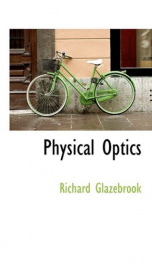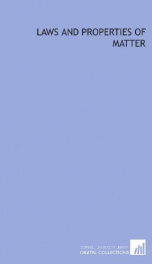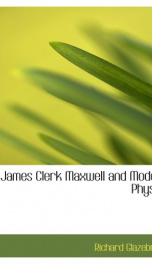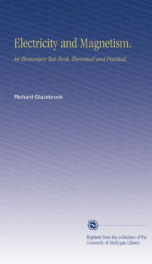heat and light an elementary text book theoretical and practical for schools an
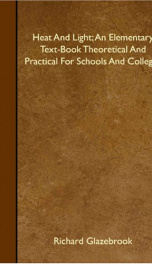
HEAT AND LIGHTS ELEMEXTARY TEST-BOOK THEORETICAL ASD PRACTICILIL - PREFACE - I T has now come to be generally recognised that the most satisfactory method of teaching the Natural Sciences is by experiments which can be performed by the learners themselves. In consequence many teachers have arranged for their pupils courses of practical instruction designed to illustrate the fundamental rinciples of the subject they teach. The portions of the fo PI owing book designated for the most part been in use for some time as a Practical Course for Medical Students at the Cavendish Laboratory. The rest of the book contains the explanation of the theory of those experiments, and an account of the deductions from them these have formed my lectures to the same class. It has been my object in the lectures to avoid elaborate apparatus I and to make the whole as simple as pssible. Most of the lecture experiments are performed wit the apparatlis which is afterwards used by the class, and whenever it can be done the theoretical consequences are deduced from the results of , these experiments. In order to deal with classes of considerable size it is necessary to multiply the apparatus to a large extent. The students usually work in paws and each pair has a separate I table. On this table are placed all the a pa. ratus for the experiments which are to be performed. Kusfo r a class of 20 there would be 10 tables and 10 specimens of each of the pieces of a paratus. With some of the more elaborate experiments t ii S plan is not possible. For them the class is oups of five or six, the demonstrator in charge tpaekrefonr mins t e necessary operations and makes the observations, a the class work out the results for themselves. It is with the hope of extending some such system as this in Colleges and Schools that I have undertaken the publication of the present book and ot, hers which are to follow. My own experience has shewn the advantages of such a plan, and I know that that experience is shared by other teachers. The practical work interests the student. The apparatus required IS simple much of it might be made with a little assistance by the pupils themselves. Any good-sized room will serve as the Laboratory. Gas should be laid on to each table, and there should be a convenient water supply accessible no other special preparation is necessary. The plan of the book will, I hope, be sufficiently clear the subject-matter of the various Sections is indicated by the headings in Clarendon t e the Experiments to be performed by the pupils are shewn t us. TO i llzcstrate the Rectilinear Propagutioon of light by t h pinhole Camera. These are numbered consecutively. Occasionally an account of additional ex eriments, to be performed with the same apparatus, is ad I ed in small type. Besides this the small-t e articles contain some numerical examples worked out, an in many cases, a notice of the principal sources of error in the experiments, with indications of the method of making the necessary corrections. These latter portions may often with advantage be omitted on first reading. A few articles of a more advanced character, which may also at first be omitted, are marked with an asterisk...
Info about the book
Author:
Series:
Unknown
ISBN:
1177211149
Rating:
3.5/5 (3)Your rating:
0/5
Languge:
English
Users who have this book
Users who want this book
What readers are saying
What do you think? Write your own comment on this book!
write a commentGenre
if you like heat and light an elementary text book theoretical and practical for schools an try:
Other books by this author
Do you want to exchange books? It’s EASY!
Get registered and find other users who want to give their favourite books to good hands!

